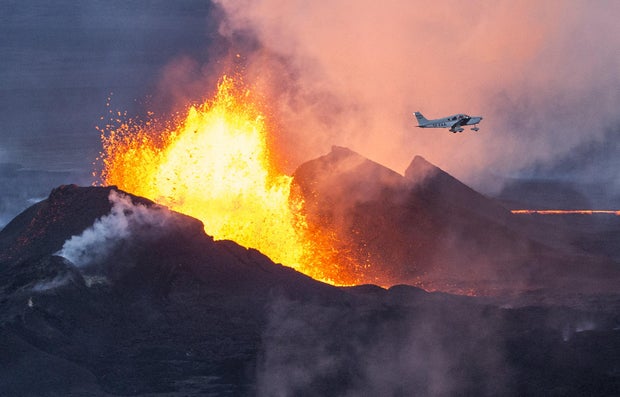More than 130 earthquakes were registered Tuesday at Iceland’s large Bardarbunga volcano, a possible precursor to an eruption among the several scenarios being considered, the Icelandic meteorological office said.
The aviation color code over the area has been changed from green to yellow as a precaution, the met office said, but the volcano’s remote location in the heart of southern Iceland’s uninhabited highlands means no infrastructure is at risk.
The series of seismic events lasted for about three hours before subsiding slightly, the met office said in a statement.
“Earthquakes continue to be detected in the area and it is too early to say whether the swarm will fade away,” it said.
The largest earthquake registered a 5.1 magnitude, it said, while 17 other earthquakes with a magnitude of 3 or higher were detected, including at least two measuring magnitude 4 or above.
The met office said the earthquakes were “consistent with increased inflation due to magma accumulation” under Bardarbunga.
“The activity will be closely monitored but it is difficult to say what the development will be at this point,” the met office said.
The caldera or hollow of the central Bardarbunga volcano is about 25 square miles and ice-filled.
It is one of six volcanic systems located under Europe’s biggest glacier Vatnajokull.
In the event of a subglacial eruption, there is a risk of an ash eruption and subglacial flooding from under Vatnajokull.
If an eruption were to occur outside the glacier, it would be a lava eruption, the met office explained.
“Seismic activity has increased in Bardarbunga in recent months,” it said, with Tuesday’s earthquake swarm the largest since Bardarbunga’s last eruption in 2014-2015 which lasted six months.
BERNARD MERIC/AFP via Getty Images
“Bardarbunga is unique in that it is an unusually large volcanic system, partly covered by a glacier, and several scenarios are possible,” the agency said. “Extensive research, along with hazard assessments and contingency planning, was conducted during the 2014–2015 eruption, which will prove valuable should further volcanic activity occur.”
That eruption created Iceland’s biggest basalt lava flow in more than 230 years but caused no injuries or damage.
Iceland has seen seven volcanic eruptions in a year near the southwestern fishing village of Grindavik, leading to the evacuation of the town. After the seventh eruption, people were evacuated from about 50 homes in Grindavík, according to the country’s Civil Protection Agency.
Iceland is home to 33 active volcanic systems, more than any other European country.
It is situated on top of a rift between two tectonic plates, which makes the island nation vulnerable to earthquakes and volcanic eruptions, which have rocked portions of the country and displaced residents in recent years.
